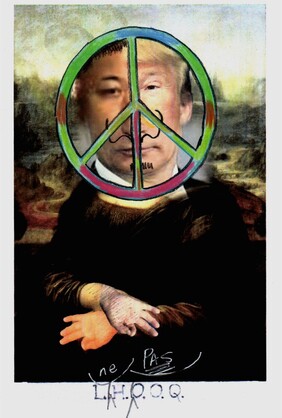PASC 2017 Symposium
Apolitical, My Ars!:
Dissent, Resistance, and Revolution in the Avant-Garde Arts
Friday, Dec. 1, 2017
The Philadelphia Avant-Garde Studies Consortium (PASC) presented its third annual symposium, “Apolitical, My Ars!: Dissent, Resistance, and Revolution in the Avant-Garde Arts,” on Friday, Dec. 1, 2017, in the Class of 1978 Pavilion, Kislak Center for Special Collections, Rare Books and Manuscripts, Van Pelt-Dietrich Library Center.
Although avant-garde work is sometimes labeled “apolitical” because of a presumed fixation on pure formal experimentation and an “art for art’s sake” aloofness, avant-garde movements and individual artists often developed in response to specific political events or more pervasive sociopolitical conditions. Harold Rosenberg posited that “the politics of an avant-garde art movement might consist of nothing more rebellious than overthrowing the conviction of the middle class that color in a painting ought to correspond to that of appearances,” but avant-garde political engagement has often gone far beyond the flouting of bourgeois aesthetics.
Whether in literature, painting, sculpture, theater, film, music, or architecture, avant-garde art has often functioned as a public political performance, bringing people together to receive ideas and images intended to radically reconfigure their societies. Jarry’s "Ubu" plays were, among other things, biting satirical critiques of the imperialistic, dictatorial rulers of his time. Likewise, the Dadaists and Surrealists, in reaction to the horrors of World War I, called for political revolution as well as a revolution of consciousness, often making direct statements of support for socialism or communism.
Works by Gertrude Stein, Djuna Barnes, and James Joyce often had political content that was more indirect but nonetheless powerful, challenging conventional thought about religion, gender, and national identity. During the Cold War years, artists such as Allen Ginsberg, Carolee Schneeman, Allan Kaprow, and Thomas Pynchon presented transgressive, counterculture work that attacked capitalism, sexism, and the military-industrial complex. Similarly, Jean-Michel Basquiat, Cindy Sherman, Bruce Nauman, Kathy Acker, Eva Hesse, Marina Abramovic, Kathy Acker, William Pope.L, Werner Herzog, and Cai Guo-Qiang, to name just a few, have all subverted various norms of class, nationality, gender, or race and have often faced a great deal of public abuse and praise for their politics.
Throughout the symposium, we explored questions like: What were they trying to change, how did they try to change it, and to what extent did they succeed? Over time, how has avant-garde curatorial or editorial practice promoted political messages in the public sphere? What are current trends in politically oriented avant-garde art, and how do they compare with past avant-gardes? How are avant-garde artists today reacting to the political atmosphere created by the Trump administration, which has threatened to eliminate the National Endowment for the Arts and the National Endowment for the Humanities?
Although avant-garde work is sometimes labeled “apolitical” because of a presumed fixation on pure formal experimentation and an “art for art’s sake” aloofness, avant-garde movements and individual artists often developed in response to specific political events or more pervasive sociopolitical conditions. Harold Rosenberg posited that “the politics of an avant-garde art movement might consist of nothing more rebellious than overthrowing the conviction of the middle class that color in a painting ought to correspond to that of appearances,” but avant-garde political engagement has often gone far beyond the flouting of bourgeois aesthetics.
Whether in literature, painting, sculpture, theater, film, music, or architecture, avant-garde art has often functioned as a public political performance, bringing people together to receive ideas and images intended to radically reconfigure their societies. Jarry’s "Ubu" plays were, among other things, biting satirical critiques of the imperialistic, dictatorial rulers of his time. Likewise, the Dadaists and Surrealists, in reaction to the horrors of World War I, called for political revolution as well as a revolution of consciousness, often making direct statements of support for socialism or communism.
Works by Gertrude Stein, Djuna Barnes, and James Joyce often had political content that was more indirect but nonetheless powerful, challenging conventional thought about religion, gender, and national identity. During the Cold War years, artists such as Allen Ginsberg, Carolee Schneeman, Allan Kaprow, and Thomas Pynchon presented transgressive, counterculture work that attacked capitalism, sexism, and the military-industrial complex. Similarly, Jean-Michel Basquiat, Cindy Sherman, Bruce Nauman, Kathy Acker, Eva Hesse, Marina Abramovic, Kathy Acker, William Pope.L, Werner Herzog, and Cai Guo-Qiang, to name just a few, have all subverted various norms of class, nationality, gender, or race and have often faced a great deal of public abuse and praise for their politics.
Throughout the symposium, we explored questions like: What were they trying to change, how did they try to change it, and to what extent did they succeed? Over time, how has avant-garde curatorial or editorial practice promoted political messages in the public sphere? What are current trends in politically oriented avant-garde art, and how do they compare with past avant-gardes? How are avant-garde artists today reacting to the political atmosphere created by the Trump administration, which has threatened to eliminate the National Endowment for the Arts and the National Endowment for the Humanities?
Artists will serve as the avant-garde: for … the power of the Arts is the swiftest and most expeditious. When we wish to spread new ideas amongst men, we use in turn the lyre, ode or song, story or novel; we inscribe those ideas on marble or canvas … We aim for the heart and imagination, and hence our effect is the most vivid and the most decisive.” |
Program
|
9:30 a.m.
Coffee 10 a.m. Welcome (David McKnight) 10:15 a.m. Papers (John Heon, Session Chair) Daniella Vinitski Mooney, “A Gift for De-Braining: Alfred Jarry, Ubu Roi and the Politics of War” David McKnight, “The Road to Ubu’s 'Nowhere': Reflections on Felix Nadar, the Franco-Polish Volunteers, and the Polish Revolution of 1830” 11:15 a.m. Project Overview, Lightning Presentation (Barry Rowell, Session Chair) Tina Brock, “Directly from Within (Entering the Void): Transcending Samuel Beckett’s Later Works as Performer, Director, and Audience” John Heon, “An Embarrassment of Humor-Noir Riches: Political Comedy in the Age of Trump” 12 noon Lunch (on your own) 1:30 p.m. Papers (David McKnight, Session Chair) John Szwed, "Jazz and Black Night Life as Roots of Abstraction" Cheryl Harper, "Dada Hashpeh: The Jewish Lineage" 2:45 p.m. Exhibition Presentation and Performance (Tina Brock, Session Chair) Laurel McLaughlin and Mechella Yezernitskaya, "Beyond Boundaries: Feminine Forms" Barry Rowell, "Peculiar Works Project, performance excerpt from 'FLOYDADA'" 3:30 p.m. Coffee 3:45 p.m. Papers (John Heon, Session Chair) Gina DeCagna, "Populist and Participatory Poetry in the Political State" Cam Scott, "But What Happened? Limited Omniscience and Military Secrecy" 4:45 p.m. Lightning Presentation/Exhibition, Performance-Lecture (David McKnight, Session Chair) Orchid Tierney, “Waste Natures” Josh Graupera, “Lil Brown Wonder’s ‘Blockadia’” 5:30 p.m. Closing Remarks (John Heon) 5:45 p.m. Refreshments 6:30 p.m. Book-Launch Party for Randall Couch’s Peal, with Orchestral Maneuvers performing selections from Peal 7:30 p.m. Reception on Moelis Terrace |
The symposium organizers thank the following for their generous support, both financial and in kind:
Kislak Center for Special Collections, Rare Books and Manuscripts
William G. Noel, Director of the Kislak Center
Elizabeth Bates, Special Project Manager, Kislak Center
Andrea Gottschalk, Kislak Center Exhibitions Coordinator
Aleta Arthurs, Penn Libraries, Events Coordinator
Gina DeCagna, PASC
Emily Brewton Schilling, PASC
Randall Couch
Anonymous
Thank you for your support.
Kislak Center for Special Collections, Rare Books and Manuscripts
William G. Noel, Director of the Kislak Center
Elizabeth Bates, Special Project Manager, Kislak Center
Andrea Gottschalk, Kislak Center Exhibitions Coordinator
Aleta Arthurs, Penn Libraries, Events Coordinator
Gina DeCagna, PASC
Emily Brewton Schilling, PASC
Randall Couch
Anonymous
Thank you for your support.


